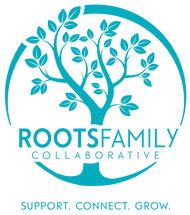Want to know more about how you are feeling?
If you would like to talk to someone at Roots who may be able to help point you in the direction of finding the help you need to feel like yourself again, please contact us. If you feel like you may hurt yourself or your baby, please call 406-586-3333 the Help Center's 24 hour Crisis Line, dial 988 the National Suicide Prevention Lifeline Network, dial 911, or go to the nearest Emergency Room.
If you aren’t feeling like yourself postpartum, it is important to know that is a common experience and to reach out for support.
Pregnancy, birth and having a baby is a time of exponential growth that can often trigger intense emotional responses from happiness and joy, to fear and anxiety. Sleep deprivation, hormonal fluctuations and new responsibilities paired with unrealistic expectations of parenthood all play a role in our postpartum mental health. At Roots Family Collaborative, we believe all families should be supported on their journey from pregnancy to parenting.
Read on to learn more. If you would like to talk to someone from Roots about how you are feeling who may help point you in the direction of getting the support you need to feel like yourself again, please contact us directly. We are here to help.
-
The Baby Blues are a normal part of your transition to having a new baby. Up to 80% of new mothers will experience the Baby Blues. The Baby Blues can last up to 2-3 weeks after birth and usually the symptoms disappear on their own.
Symptoms of the Baby Blues may include:
Feeling let down
Crying for no apparent reason
Impatience
Irritability
Restlessness
AnxietyEven though the Baby Blues is relatively short-lived, it can be a very intense period for a new mother. It is important to always reach out and let someone know you how are feeling. No one was meant to parent alone. There is no shame in admitting things are hard for you. Support during the postpartum period is NOT a luxury, it is a necessary part of growing a family.
-
Postpartum Depression is the umbrella term for a range of mood disorders that can present during or after childbirth. Professionals usually refer to this range as Perinatal Mood or Anxiety Disorders (PMADs). Perinatal is the term that defines pregnancy and the first year postpartum.
Postpartum Depression is the NUMBER ONE COMPLICATION FOLLOWING CHILDBIRTH. 1 in 7 women will suffer from a form of depression during pregnancy or after the birth of a child. That's roughly 800,000 moms each year. Not only do mothers suffer, but partners suffer as well -- 1 in 10 dads will suffer from a form of postpartum depression.
It is important that new parents understand that postpartum depression does not always look like our imagined version of depression, think weepiness, inability to get out of bed, etc.. PPD can range from mild to severe and can present in a number of ways. When depressive symptoms dominate, we refer to it as postpartum depression. When anxiety symptoms dominate we call it a postpartum anxiety disorder, and included in postpartum anxiety disorders are postpartum panic, postpartum obsessive compulsive disorder, and postpartum post traumatic stress disorder.
Here are some common questions that can help you start the conversation with yourself, your partner, and your care provider if you are just not feeling like yourself:
Are you feeling sad or depressed?
Do you feel more irritable or angry with those around you?
Are you having difficulty bonding with your baby?
Do you feel anxious or panicky?
Are you having problems with eating or sleeping?
Are you having upsetting thoughts that you can’t get out of your mind?
Do you feel as if you are “out of control” or “going crazy”?
Do you feel like you never should have become a mother?
Are you worried that you might hurt your baby or yourself?
Signs and Symptoms of a PMAD:
Feelings of inadequacy
Confusion
Loss of appetite
Difficulty in focusing
Excessive worry
Easily irritated
Trouble falling asleep
Trouble staying asleep
Sleeping too much
Sadness
Mental fog
Rage
Lack of sexual desire
Negative or scary thoughtsIf you or your partner are experiencing symptoms after the birth of your baby, it is important that you let your health care provider know. You are not alone. You are not to blame, and with help you will feel like yourself again.
-
Some women do not feel sad and depressed, rather they feel very anxious and worried. Pregnancy and postpartum anxiety are temporary and can be treated with appropriate professional help.
Some people describe postpartum anxiety like this:
intense anxiety or fear
constant worry
rapid heart rate
sense of overwhelming dread
loss of appetite
chest pain
shakiness or dizziness
racing thoughts
irritability
insomniaPostpartum Anxiety Disorders include, Postpartum Panic Disorder, Postpartum Obsessive Compulsive Disorder and Postpartum Post Traumatic Stress Disorder.
Postpartum Panic Disorder can look like this:
shortness of breath/chest pain
claustrophobia
dizziness
heart palpitations
numbness and tingling in the extremities.Please know that postpartum panic attacks will pass and will not hurt you. If you or your partner is experiencing symptoms, please reach out to your healthcare provider and know you are not to blame for feeling this way. Reaching out for help is the first step to feeling like yourself again.
-
Intrusive thoughts often feel scary and out of character for a mother. These scary or intrusive thoughts can be fleeting or constant, involve your baby, your partner or yourself and may be accompanied by compulsive behaviors. If you are having thoughts of hurting your baby, your partner or yourself, it is very unlikely that you will act upon these thoughts as they are only thoughts. They are NOT urges or desires. Having these types of thoughts does not mean you are a bad mother. These thoughts are NOT about who you are -- they are symptoms and can be treated with the appropriate support.
Postpartum Obsessive Compulsive Disorder can look like this:
anxiety
depression
repetitive behavior
excessive cleaning
intrusive, repetitive thoughts (possibly even thoughts of harming the baby and/or self)
avoiding the baby and/or other people, along with negative stimuli such as intense or scary movies or TV programs, bad news or stories, to alleviate intrusive thoughts.
If you or your partner is experiencing these symptoms, please reach out to your healthcare provider. You are not to blame for feeling this way and with the appropriate support, you will feel like yourself again.
Postpartum Post Traumatic Stress Disorder can look like this:
intrusive re-experiening of a past event, which could be the birth itself
flashbacks or nightmares
avoidance of people, places, feelings associated with the event
anxiety and panic attacks
increased irritability, difficulty sleeping, exaggerated startle response
Approximately 9% of women will experience postpartum post-traumatic stress disorder (PTSD) following childbirth. Most often, this illness is caused by a real or perceived trauma during delivery or postpartum.
-
Postpartum Psychosis is the most rare, yet the most severe postpartum condition that is often misdiagnosed as postpartum depression. Postpartum Psychosis only occurs in about 1 out of 1,000 postpartum women and is often associated with bipolar illness.
The most common symptoms are:
severe agitation
delusional or bizarre thinking
hallucinations
insomnia
confusion
a feeling of being out of touch with realityAlthough Postpartum Psychosis is a rare condition, it is always an emergency and requires immediate medical attention. If you or your partner are experiencing any of these symptoms or feel as you may harm yourself or your baby, please reach out to your healthcare provider, go to the Emergency Room or call The Help Center at 406-586-3333.




